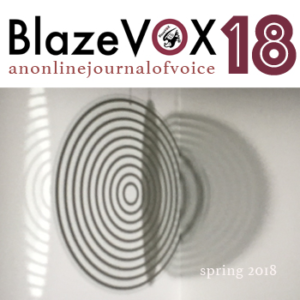IntroductionIntroduction
 Hello and welcome to the Spring issue of BlazeVOX 18. Presenting fine works of poetry, fiction, text art, visual poetry and arresting works of creative non-fiction written by authors from around world. Do have a look through the links below or browse through the whole issue in our Scribd embedded PDF, which you can download for free and take it with you anywhere on any device. Hurray!
Hello and welcome to the Spring issue of BlazeVOX 18. Presenting fine works of poetry, fiction, text art, visual poetry and arresting works of creative non-fiction written by authors from around world. Do have a look through the links below or browse through the whole issue in our Scribd embedded PDF, which you can download for free and take it with you anywhere on any device. Hurray!
In this issue, we seek to avoid answers but rather to ask questions. With a subtle minimalistic approach, this issue of BlazeVOX focuses on the idea of ‘public space’ and more specifically on spaces where anyone can do anything at any given moment: the non-private space, the non-privately owned space, space that is economically uninteresting. The works collected feature coincidental, accidental, and unexpected connections, which make it possible to revise literary history and, even better, to complement it.
Combining unrelated aspects lead to surprising analogies these pieces appear as dreamlike images in which fiction and reality meet, well-known tropes merge, meanings shift, past and present fuse. Time and memory always play a key role. In a search for new methods to ‘read the city,’ the texts reference post-colonial theory as well as the avant-garde or the post-modern and the left-wing democratic movement as a form of resistance against the logic of the capitalist market system.
Many of the works are about contact with architecture and essential living elements. Energy (heat, light, water), space, and landscape are examined in less obvious ways and sometimes developed in absurd ways. By creating situations and breaking the passivity of the spectator, to develop forms that do not follow logical criteria but are based only on subjective associations and formal parallels, which incite the viewer to make new personal associations. These pieces demonstrate how life extends beyond its own individual limits and often tells a story about the effects of global cultural interaction over the latter half of the twentieth century. It challenges the binaries we continually reconstruct between Self and Other, between our own ‘cannibal’ and ‘civilized’ selves. Enjoy!
Rockets! Geoffrey Gatza, editor
Two Verse Plays — Sue Brannan Walker
White Elevators — Malika K. McCoy
Fashion Victim — Veronica Abrams
Excerpt from Whiplash Girlchild — Sascha Akhtar
Nobody Talks About — Rebecca L. Monroe
Together, Hips Grinding — Hareendran Kallinkeel
The Tale of Martin Namibia — Alaric von Satyrane
Barely Bitten — Kennedy Harrison
The Light of Dawn — Spencer Wimmer
Snakes in the Grass — Kevin Ryan
La vie en rose — hiromi suzuki
Chronology Poems — Sacha Archer
Praises and Comeuppances – Elizabeth Alexander
The First Jamaican Church Experience — Kevin Ryan
There Were Wolves in Albuquerque’s South Side; Circa 1999 — Rebecca Melson
New and Forthcoming from BlazeVOX books
Let’s twin and twine together two primary aspects of how America can see herself—the good atoms of Whitman’s leaves of grass, and the engines humming their freedom on the highways that cut across those 19th century fields. Now, Jason Labbe well knows, as Whitman’s atoms become pixels, we find ourselves at a crossroads, learning again and again the consequences of “the indescribable way you shape / a past of little use.” —Dan Beachy-Quick
The Moon Blooms in Occupied Hours by Anis Shivani
Anis Shivani’s The Moon Blooms in Occupied Hours jets us from China to Mexico to Poland to Los Angeles in a breathless, dazzling instant. Imagery shimmers in strobe light as cities rise and fall, and art propels a “naked urgency to hallucinate.” Shivani’s poems cast civilization as a kaleidoscopic, cosmopolitical carnival, which feels unreal until we consider the actual implications of our lives: information surging into us at every moment, where “rude newspapers” sing of “crisis and apocalypse.” — Hadara Bar-Nadav
Hurled into Gettysburg by Theresa Wyatt
Hurled into Gettysburg, Theresa Wyatt’s poem/stories is a stunning evocation of the 1863 Battle of Gettysburg. Wyatt brings this moment in history to an urgent immediacy. With shimmering intensity, she conjures scenes on the battlefield and in the domestic lives of everyday citizens. The tragedy of slavery and the devastating losses of war sit poignantly on the page next to images of love and tenderness. —Irene Sipos
Luke McMullan’s experiment in poetic ‘thick translation’ defies the common notion of a translation as a substitute for the original text. Instead, the poet-translator offsets the text, a ruin, with multiple translations done according to different methods, like Mount Fuji in Hokusai’s woodblock series, and with multiple commentaries on the language of the original. This elegant little book is itself an allegory of translation—and of reading in general—as an act of encountering, rather than appropriating, the Other. —Eugene Ostashevsky
The Reaganites Vol. 1 & Vol. 2 by Tim Roberts
Here is a monstrous demonstration of the bloat conditions of our world. Written to extremes, as if to show how truly, really, impossible the current state of language and culture has become. The Reaganites is an iconic book that declares its importance in advance of reading by its sheer heft and volume. Put it in full view as a kind of dare, a gauntlet thrown in the face of literary decorum. For here is an argument that cannot be overlooked. —Johanna Drucker
Back Principles: a book of spiritual fatigue by Stephen Bett
Like all Stephen Bett’s recent books, his 22nd, Back Principles: a book of spiritual fatigue, is a serial poem, “minimalist” in its poetics, and subtle enough to sustain repeated readings. The title is self-explanatory: poems journeying between poles, searching out the buddha and the christ. There are no (cheap) instant gratification I found its here. There never could be of course; it’s all journey, all the time.
Lecture Notes by Deborah Meadows
Deborah Meadows’ Lecture Notes engages conceptual poetry but insists on creative editing. Meadows captures lectures in notes and peers into their materials through poetry. Her method contrasts conflict and cooperation to lure the reader into reconsidering the games of value systems without evaluating the games. —James Sherry
Frame Narrative by Dennis Barone
Frame Narrative by Dennis Barone is an exquisite book whose poems spin out of a surreal universe into wisps of narrative and back again. Beautifully imagistic, these poems give voice to the unknown and unknowable. —Maria Mazziotti Gillan
Around the day in 80 worlds by Rachel Blau DuPlessis
Around each day, she flies her rounds— tempestuous. DuPlessis revels in travel and records what unravels in one’s habits of attention when all the elsewheres return us to a home we are about to lose. “What is the true story of any time? / any itinerary?/ and of its travelling sorrows?” The poems resemble conversations that rise and set, on long journeys, in turns light or rueful, bright or bruised: monologues that trail the trails. —Divya Victor
Non Sequitur Syndrome by Goro Takano
In this book, the desire for clarity is pitted against the lust for ambiguity, and the desire to be saved collides with the urge to self-destruct. Also, in this book, what I am (as male, father, widower, heterosexual, poet, Japanese native living in Japan, and so on) coexists with what I am not. Some of the works included in Non Sequitur Syndrome are love poems, while some others are death poems. You may see all of them as love-death poems or poems about poetry itself. Anyway, my only hope is that you will somehow like this book.



Comments (0)